
Meet Tina Nguyen! She’s a gender and sexuality studies major with an interest in developing a career in the OBGYN field. She also just got back from Feminist Camp in Seattle, thanks to a grant from NCI.
Describe yourself and why you wanted to attend Feminist Camp:
I have considered myself to be a feminist from a young age, and yet, in college, I found myself still struggling to define feminism. I knew that there was no hard and fast definition, but I wanted to develop my own sense of feminism and understand how it could inform my life. I wanted to go to Feminist Camp because I believed that it would allow me to learn from other like-minded individuals about their feminism and how they use their feminism in their everyday lives. I was also intrigued that Feminist Camp placed a lot of emphasis on feminist career and professional development. I didn’t quite understand what that meant as it was advertised to me, but it sounded like the opportunity that I was searching for. I major in gender and sexuality studies here at Tulane, but my goal is to go to medical school to become a gynecologist and obstetrician. As someone heading into the medical field, I am always anxious that I won’t be able to engage in feminism in the same way as I have done in college, and I was hoping that this program would give me the proper skills necessary to carry my feminist ideals with me in my many endeavors to come.
What were your favorite parts of the conference?
There was so much that I loved about this conference, but first and foremost, my favorite part about Feminist Camp is the community that I was able to be a part of. From the program director, to the site coordinators, to the campers themselves, I felt that over the course of five short days, we were able to build and sustain a close-knit community that felt comfortable. This type of instant friendship and community is rare, and I feel fortunate to have been able to contribute and learn. This small group of women were supportive and respectful, enabling every member of the group to show their vulnerability and express their strengths. I learned so much simply through the exchange of stories and life experiences with these incredible women.
Feminist Camp cannot be classified as a conference or a program, because its non-traditional approach is what makes this experience special. The speakers who shared their experiences were able to speak from a deeply personal place, and part of that is due to the small size of the group. Each talk was very tailored to the needs of the group and every speaker worked to tackle some of the biggest questions that we had. One of the most unexpected portions of this week was getting to spend a day at a major video game studio called Bungie. We started the day at the studio with a panel speaking to the women who worked there, and it was fascinating to learn about their struggles in a field where I did not even expect to find feminism at all. The work that they do to change the status quo in the gaming industry is inspiring, and it’s encouraging to know that progress is being made.
Lastly, I loved getting to know Seattle over the course of my week at Feminist Camp. Surprisingly, the weather was more than beautiful, and the group was able to bond outside of camp hours by exploring Seattle’s various neighborhoods and soaking in everything the city had to offer. We were able to fall in love with the city, while at the same time learning about the problems that Seattle faces. It seemed that Seattle was in on our Feminist Camp program, and I found that everything from restaurants to bauble shops embodied the feminist values that we spent all week speaking about. Seattle’s Town Hall hosts many talks, and we were lucky enough to attend a talk by Ijeoma Oluo, who wrote a viral article on Rachel Dolezal, and her brother, Ahamefule Oluo, renowned musician and comedian. This talk was completely unplanned on our part, but the themes spoken about addressed the issues that we had been discussing in our camp sessions. Later that same night, we met Lindy West, notable for her writing in Jezebel and The Guardian, and fellow feminist. It was these unplanned happenings that proved that Seattle was the perfect location for Feminist Camp.
Tell us something you learned on reproductive health and reproductive justice:
This program was not particularly centered on reproductive health and reproductive justice; however our first day of sessions was geared towards reproductive justice. One of the first speakers that we heard from was from NARAL Pro-Choice Washington, and she told us a story that spoke volumes about the stigma that surrounds abortion. As a young woman, this speaker was asked to be on an MTV special that featured women who had gone through an abortion, but since she was not showing enough remorse, the show host harassed her on television in the effort to make her cry for ratings. This horrible experience enabled her to jumpstart a career in the fight for reproductive justice, and her main mode for doing so is through storytelling. What I took away from this experience was that the fight for reproductive justice is deeply personal. Women’s health and reproductive justice issues are often framed as these overly political problems, and the truth of the matter is, these issues affect people on an individual level and their voices are the most important.
Detail what you learned that you hope to never forget:
While the speakers that we heard from were from all different professional backgrounds, they all touched on a couple of themes that threaded their sessions together. One piece of advice was to learn how to recognize your own self-worth. Even incredible women who are experts in their field have a hard time believing in their own worth. Many of these leaders asked us to believe in ourselves and our own abilities because that will enable us to demand what is rightfully ours. One speaker particularly told us to value our time. I find myself giving away my time very willingly in an effort to feel useful, but she asked us to value the time and energy that we put into projects. Sharing your expertise, energy, or time should not be for free. This same speaker asked us to view ourselves as resources. It is so easy to look at another person and see what they can offer you, but very hard to figure out what you have to offer.
Another piece of advice that stuck with me was the concept that your input should equal the output. For every project, personal or professional, if you put in time and energy, the output should be equal to that. So often, women will put in so much emotional and physical work and the payoff does not adequately compensate for that work. Establishing this output/input equilibrium has allowed many successful women to find a career path that is fulfilling and which enables them to do meaningful work.
After this week, I have so much more confidence in how feminism is going to play a role in my future career. One of the easiest ways to incorporate feminism into everyday life is to support other women. Women supporting women and building that network was another common thread among the many speakers that we heard from. Giving everyone the space that they need to grow and succeed is very important feminist work, and I hope that I can bring that philosophy with me to Tulane and beyond. The reason that we were able to speak to so many wise and successful women on this trip was because they have built a feminist network with each other. Many of them had come into contact with each other before regardless of the fact that their careers were drastically different due to the fact that each person we spoke to goes out of their way to support women doing good work in their city.

Why should other students attend Feminist Camp?
I might still be in the conference afterglow, but I think that anyone who is interested even remotely should try to attend Feminist Camp because it was an impactful experience. The past year has been very rough with the recent presidential election and a news cycle that always seems to be full of negatives. Feminist Camp reminded me that there are people who think just like me and who are actively working to change the status quo. Also, at the point in my life where my future feels very up in the air, it was reassuring to hear from successful women that life is not linear, and that it’s fine to make mistakes and take unexpected turns. It might sound cheesy, but students should go to Feminist Camp to be inspired. If anything, you’ll leave camp with a brand new network and reliable friends. I feel grateful that I have a community like NCI at Tulane, but many of the other campers felt like outsiders on their campuses and in their lives. Feminist Camp gave us a chance to dig deep into feminism and learn how to embody it in our work.
How did this experience help with your future ambitions?
I’ve already hit on most of the professional advice that I received above, but this week has really solidified my desire to become a doctor. I believe that I can make a change in the medical field where so often women, non-binary folks, people of color, among so many others are not taken seriously. People ask me all of the time why I want to be a doctor, and my answer to that is that I want to support women. As someone who wants to be an OBGYN, I see this field as my space to embody the idea of women supporting women. Camp has made me more passionate and excited as ever to move forward in my career.
Does this sound like something you might be interested in? Tulane undergraduate students can apply to NCI for funding to attend Feminist Camp. Email Betsy Lopez at elopez@tulane.edu for more information.
Responses have been lightly edited for length and clarity.
